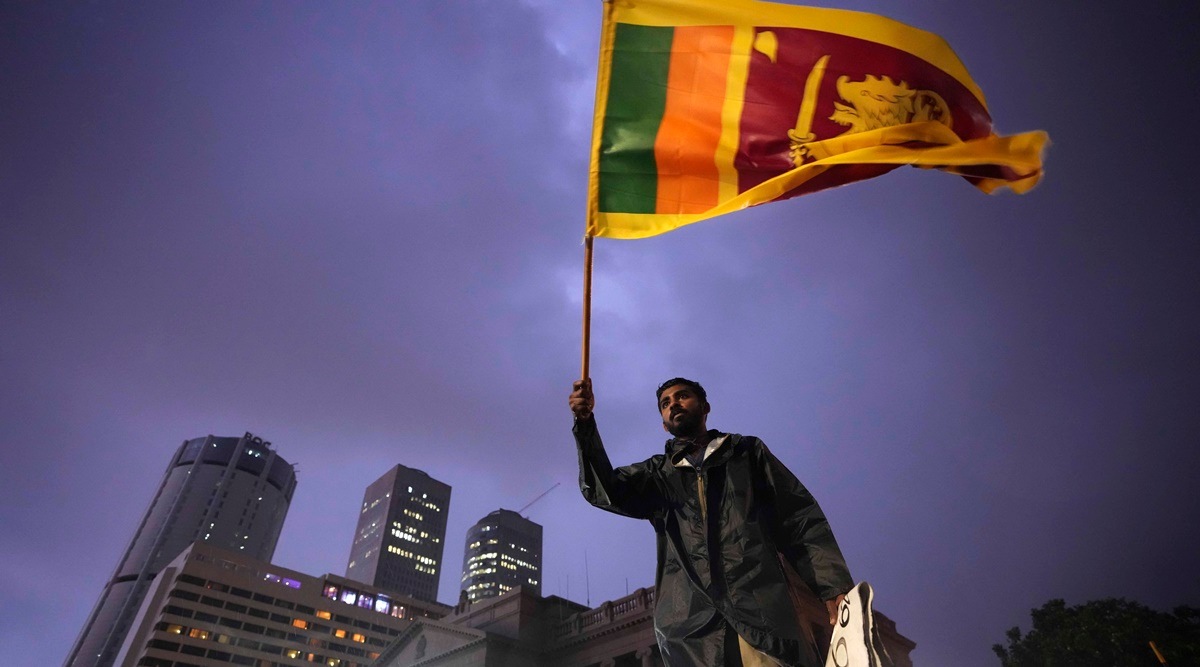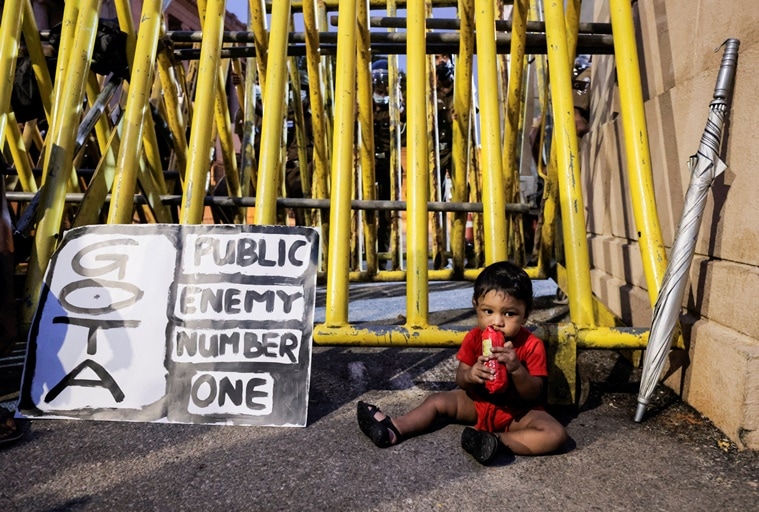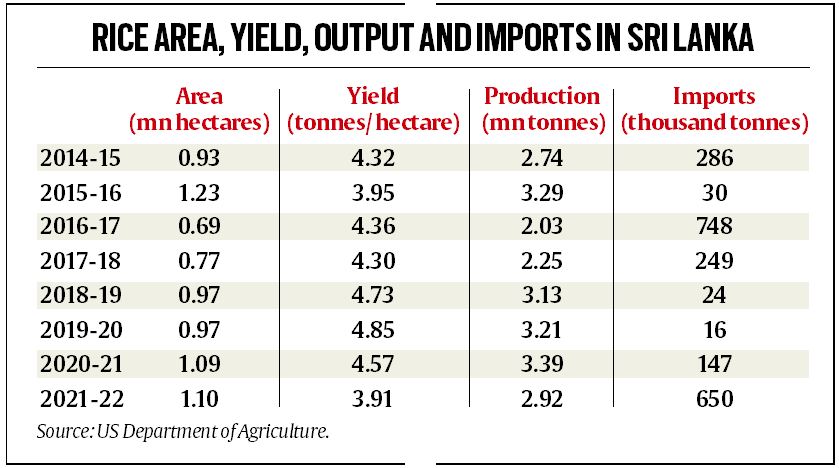 A man waves a Sri Lankan national flag as he stands on a barricade blocking the entrance to president's office during a protest in Colombo, Sri Lanka, April 11, 2022. (AP)
A man waves a Sri Lankan national flag as he stands on a barricade blocking the entrance to president's office during a protest in Colombo, Sri Lanka, April 11, 2022. (AP)Sri Lanka Crisis Live News Updates: Sri Lankan officials Tuesday said that the crisis-hit country will temporarily suspend foreign debt payments to avoid a hard default, Reuters reported, as its limited foreign reserves are required for imports of essential items such as fuel. A statement by the Finance Ministry said that the country will default on its external debt pending a bailout package from the International Monetary Fund. The interim policy shall “apply to amounts of affected debts outstanding on April 12, 2022,” it said.
Meanwhile, two members who had earlier left the ruling coalition returned to the party-fold Tuesday. The members, including Shantha Bandara of the Sri Lanka Freedom Party, took oath as state ministers. According to sources accessed by PTI, with members returning, Rajapaksa may appoint his cabinet on Tuesday. On Monday, however, the dissident political parties had expressed willingness to form an interim government under a new Prime Minister.
PM Mahinda Rajapaksa in a televised speech to the nation appealed for an end to the protests, which continued across Sri Lanka on Monday. He assured the government is launching a plan to rebuild the country, adding that “every second” protesters spend demonstrating on the streets takes away opportunities to receive crucial foreign currency.
 A baby holds a packet of biscuits as he sits in front of the metal barrier at the Presidential Secretariat during a protest against Sri Lanka President Gotabaya Rajapaksa, amid the country's economic crisis in Colombo, Sri Lanka, April 11, 2022. (Reuters)
A baby holds a packet of biscuits as he sits in front of the metal barrier at the Presidential Secretariat during a protest against Sri Lanka President Gotabaya Rajapaksa, amid the country's economic crisis in Colombo, Sri Lanka, April 11, 2022. (Reuters)

Sri Lanka will temporarily suspend foreign debt payments to avoid a hard default, the Central Bank Governor said on Tuesday, with its limited foreign reserves required for imports of essential items such as fuel.
According to the interim policy released by the Finance Ministry, the country will "suspend normal debt servicing of all Affected Debts (as defined below), for an interim period pending an orderly and consensual restructuring of those obligations in a manner consistent with an economic adjustment program supported by the IMF."
"The policy of the Government as discussed in this memorandum shall apply to amounts of Affected Debts outstanding on April 12, 2022. New credit facilities, and any amounts disbursed under existing credit facilities, after that date are not subject to this policy and shall be serviced normally," the press release by the Finance Ministry said.
Even as widespread protests continue across Sri Lanka, two of the members who had earlier left Rajapaksa-led ruling coalition, returned to the party fold Tuesday.
The members, including Shantha Bandara of former President Maithripala Sirisena's Sri Lanka Freedom Party (SLFP), took oaths as state ministers, days after they had resigned from their positions to protest the government's economic mismanagement.
According to sources, with dissidents softening their stance, Rajapaksa may appoint his cabinet on Tuesday, news agency PTI reported.
Sri Lankan Prime Minister Mahinda Rajapaksa’s address to the nation Monday night was his first direct outreach to the people since the economic crisis triggered crippling food and fuel shortages and engulfed the country in protests.
Here are the main takeaways from Rajapaksa’s speech:
1) He made it plain that the Rajapaksa ruling family is not going to step down just because youngsters are out on the streets demanding they resign. He harked back to his leadership during the military defeat of the LTTE to make the point that he had saved the country from disaster then and was capable of doing so now.
2) By linking the anti-Rajapaksa protests, peaceful so far, to previous violent insurrections in Sri Lanka by the Janatha Vimukthi Peramuna (JVP), and Tamil militancy, he tried to paint them as anti-democratic for dissing elected representatives. Read more
Sri Lankan officials on Tuesday said that the crisis-hit country will temporarily suspend foreign debt payments to avoid a hard default, with its limited foreign reserves required for imports of essential items such as fuel.
"It has come to a point that making debt payments are challenging and impossible. The best action that can be taken is to restructure debt and avoid a hard default," Central Bank Governor P. Nandalal Weerasinghe told reporters. (Reuters)
Sri Lankan Prime Minister Mahinda Rajapaksa appealed for protesters to end the weeks of mass demonstrations that have called for the government to resign over the country's worst economic crisis in decades.
Mahinda Rajapaksa blamed the foreign exchange crisis on Covid-19 restrictions and the loss of crucial tourism income. "We are embarking on an enormous program to overcome the crisis we face today. Every second spent by the president and this government is used up exhausting avenues to rebuild our country,'' he said.
"Friends, every second you protest on the streets, our country loses opportunities to receive potential dollars,'' he said.
In his speech, Rajapaksa refused to yield power, saying the governing coalition will continue to rule Sri Lanka because opposition parties rejected the call for a unified government. "We invited all political parties represented in Parliament to join us and uplift the country. But they did not join us,'' Rajapaksa said. "As the party in power, we took up that responsibility.'' (AP)
Sri Lanka’s rice production has fallen 13.9% in 2021-22 (April-March) and average yield per hectare by 14.4%, even as imports have soared to a five-year-high.

To what extent is this crisis an outcome of the Gotabaya Rajapaksa government’s banning import of inorganic fertilisers and agro-chemicals on May 6, 2021, before its revocation over six months later on November 24?
Table 1 shows that Sri Lanka’s rice output dropped significantly to 2.92 million tonnes (mt) in 2021-22, from the previous year’s 3.39 mt. The US Department of Agriculture further estimated the island nation’s imports at 0.65 mt as a result of lower domestic production. Read Harish Damodaran's explainer here
As Sri Lanka’s political vacuum extended into its tenth day, and protesters demanding the resignation of the Rajapaksa family pitched tents near the presidential office on the main seafront, the country’s former prime minister Ranil Wickremesinghe summed up the way forward in one line: President Gotabaya Rajapaksa must resign or explain to the people why he won’t.
Speaking to The Indian Express, Wickremesinghe also said that to tide over the current food shortage, Sri Lanka must tap its friends in South Asia — India, Pakistan and Bangladesh — to “borrow” foodgrains that could be returned after two or three years.
He also suggested that a consortium of India, Japan, China, South Korea and the EU could help Sri Lanka until negotiations with the IMF are concluded and the implementation of a bailout begins. He flagged that Indian credit lines for fuel and food would run out by May, and Sri Lanka had to take steps right now to prevent the crisis from overtaking the country. Read more
Good morning and welcome to our live blog!
Political parties are set to resume talks with the Sri Lankan President on forming an interim government. On Monday, they expressed willingness to form a short-term government to tide over the crisis with a new Prime Minister.
Stay tuned as we bring you the latest updates on the Sri Lankan crisis!